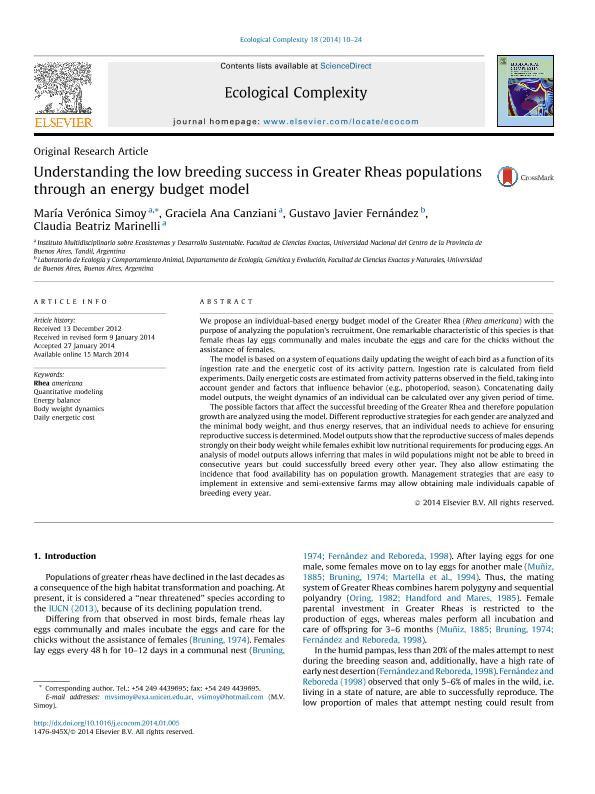Mostrar el registro sencillo del ítem
dc.contributor.author
Simoy, Maria Veronica

dc.contributor.author
Canziani, Graciela Ana

dc.contributor.author
Fernandez, Gustavo Javier

dc.contributor.author
Marinelli, Claudia Beatriz

dc.date.available
2017-12-27T20:02:00Z
dc.date.issued
2014-03
dc.identifier.citation
Marinelli, Claudia Beatriz; Fernandez, Gustavo Javier; Simoy, Maria Veronica; Canziani, Graciela Ana; Understanding the low breeding success in Greater Rheas populations through an energy budget model; Elsevier Science; Ecological Complexity; 18; 3-2014; 10-24
dc.identifier.issn
1476-945X
dc.identifier.uri
http://hdl.handle.net/11336/31722
dc.description.abstract
We propose an individual-based energy budget model of the Greater Rhea (Rhea americana) with the purpose of analyzing the population's recruitment. One remarkable characteristic of this species is that female rheas lay eggs communally and males incubate the eggs and care for the chicks without the assistance of females. The model is based on a system of equations daily updating the weight of each bird as a function of its ingestion rate and the energetic cost of its activity pattern. Ingestion rate is calculated from field experiments. Daily energetic costs are estimated from activity patterns observed in the field, taking into account gender and factors that influence behavior (e.g., photoperiod, season). Concatenating daily model outputs, the weight dynamics of an individual can be calculated over any given period of time. The possible factors that affect the successful breeding of the Greater Rhea and therefore population growth are analyzed using the model. Different reproductive strategies for each gender are analyzed and the minimal body weight, and thus energy reserves, that an individual needs to achieve for ensuring reproductive success is determined. Model outputs show that the reproductive success of males depends strongly on their body weight while females exhibit low nutritional requirements for producing eggs. An analysis of model outputs allows inferring that males in wild populations might not be able to breed in consecutive years but could successfully breed every other year. They also allow estimating the incidence that food availability has on population growth. Management strategies that are easy to implement in extensive and semi-extensive farms may allow obtaining male individuals capable of breeding every year.
dc.format
application/pdf
dc.language.iso
eng
dc.publisher
Elsevier Science

dc.rights
info:eu-repo/semantics/openAccess
dc.rights.uri
https://creativecommons.org/licenses/by-nc-nd/2.5/ar/
dc.subject
Rhea Americana
dc.subject
Quantitative Modeling
dc.subject
Energy Balance
dc.subject
Body Weight Dynamics
dc.subject.classification
Matemática Pura

dc.subject.classification
Matemáticas

dc.subject.classification
CIENCIAS NATURALES Y EXACTAS

dc.title
Understanding the low breeding success in Greater Rheas populations through an energy budget model
dc.type
info:eu-repo/semantics/article
dc.type
info:ar-repo/semantics/artículo
dc.type
info:eu-repo/semantics/publishedVersion
dc.date.updated
2017-12-27T15:19:51Z
dc.journal.volume
18
dc.journal.pagination
10-24
dc.journal.pais
Países Bajos

dc.journal.ciudad
Amsterdam
dc.description.fil
Fil: Simoy, Maria Veronica. Universidad Nacional del Centro de la Provincia de Buenos Aires. Facultad de Ciencias Exactas. Instituto Multidisciplinario de Ecosistemas y Desarrollo Sustentable; Argentina. Consejo Nacional de Investigaciones Científicas y Técnicas; Argentina
dc.description.fil
Fil: Canziani, Graciela Ana. Universidad Nacional del Centro de la Provincia de Buenos Aires. Facultad de Ciencias Exactas. Instituto Multidisciplinario de Ecosistemas y Desarrollo Sustentable; Argentina
dc.description.fil
Fil: Fernandez, Gustavo Javier. Universidad de Buenos Aires. Facultad de Ciencias Exactas y Naturales. Departamento de Ecología, Genética y Evolución; Argentina. Consejo Nacional de Investigaciones Científicas y Técnicas; Argentina
dc.description.fil
Fil: Marinelli, Claudia Beatriz. Universidad Nacional del Centro de la Provincia de Buenos Aires. Facultad de Ciencias Exactas. Instituto Multidisciplinario de Ecosistemas y Desarrollo Sustentable; Argentina
dc.journal.title
Ecological Complexity

dc.relation.alternativeid
info:eu-repo/semantics/altIdentifier/doi/http://dx.doi.org/10.1016/j.ecocom.2014.01.005
dc.relation.alternativeid
info:eu-repo/semantics/altIdentifier/url/http://www.sciencedirect.com/science/article/pii/S1476945X14000221
Archivos asociados
